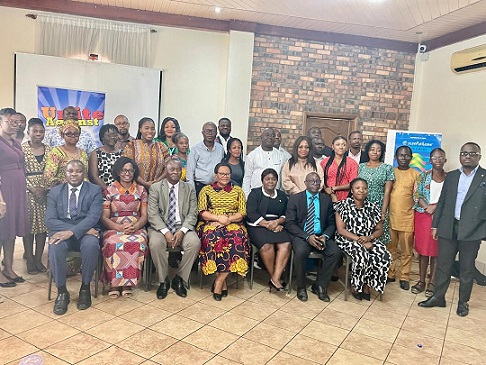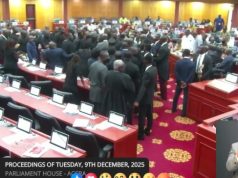The Ghana Anti-Corruption Coalition (GACC) has called on the President of Ghana to ensure that Parliament fast-tracks the process for the passage of the Code of Conduct of Public Officers (CoPO) Bill into law.
According to GACC, the bill is important as it will serve as a reference and benchmark for ethical conduct in Ghana’s Public Service by clarifying key issues such as conflict of interest, public appointments, and asset declarations.
The inability to pass the Bill currently in the cabinet has stifled the collective efforts at helping public officers avoid compromising and conflicting situations in public office.
The passage of this bill is seen as vital for strengthening the legal framework around conflict of interest management and asset declaration. If passed, it would be a significant achievement and a key legacy for the current president.
The Executive Secretary of the Ghana Anti-Corruption Coalition (GACC), Beauty Emefa Narteh, made this statement during the GACC’s Trainer of Training on Conflict of Interest for Selected Project Institutional Partners held in Accra.
The event was also aimed at providing essential training for public officials, emphasizing the importance of understanding and addressing conflicts of interest in their roles.
According to Madam Beauty Emefa Narteh, there is a crucial need for public sector institutions to establish internal mechanisms to deal with conflicts of interest effectively.
Explaining that the absence of such mechanisms could lead staff to make discretionary decisions, potentially fostering corruption.
Stressing that while conflicts of interest are not inherently corrupt, they are often at the root of many corruption cases, making it crucial for officials to be vigilant.
As the country approaches elections, public officials are reminded of their duty to prioritize public interest over personal or political gains.
The Director of Anti-Corruption at the Commission on Human Rights and Administrative Justice (CHRAJ), Stephen Azantilow, also highlighted the critical role of conflict of interest regulations in guiding the conduct of public officers in Ghana.
“When the 1992 Constitution was drafted, it was recognized that there was a need for provisions to guide public officers in their duties. This was to provide them with clear principles on how to perform their roles in public service,” he explained.
He pointed out that conflict of interest is specifically addressed in Article 284 of the Constitution, which prohibits public officers from allowing their private interests to interfere with their official responsibilities.
“Article 284 is crucial as it bars public officers from placing themselves in situations where their personal interests could compromise their duties,” Azantilow stated.
Azantilow further underscored the trust that the people of Ghana place in their public servants, noting that those in public office must act in ways that maintain public confidence.
Holding public office means that the people of Ghana have entrusted you with the responsibility of serving on their behalf. It is essential to conduct yourself in a manner that preserves that trust,” he added.
Additionally, Azantilow called for the establishment of provisions requiring institutional heads to closely monitor their staff and officers, ensuring they do not cross conflict of interest thresholds or red lines in their various roles.
Such measures, he argued, would enhance the integrity of public service and prevent conflicts of interest from undermining the effective delivery of public duties.
The Executive Director of the Ghana Integrity Initiative (GII), Mary Awelena Addah, emphasized the critical role of managing conflicts of interest in preventing corruption.
She highlighted that in a society where various interests exist, conflicts are inevitable. Some interests may take precedence over others, leading to potential ethical dilemmas.
She stressed the importance of understanding the type of conflict one is involved in and taking steps to either manage or eliminate it. One key approach she highlighted was the importance of disclosure.
“Disclosure is crucial because it helps one to navigate the hurdles associated with conflicts of interest. By declaring your interests, you can avoid potential conflicts or perceptions of conflict,” Mrs. Addah explained.
However, she urged individuals to avoid conflicts of interest whenever possible by proactively declaring their interests, thereby contributing to the broader fight against corruption.
Background
Ghana’s Parliament approved the National Anti-Corruption Action Plan (NACAP), with the objective of mobilising efforts and resources of stakeholders to prevent and combat corruption by promoting high standards of ethics and integrity and strict enforcement of relevant laws.
The NACAP assigns activities to be implemented by all partners in the public, private, and Civil Society sectors. These activities are based on the four strategic objectives of the NACAP, using the three-pronged approach: prevention, education, and investigation and enforcement.
The NACAP encourages implementing institutions to integrate anti-corruption measures into their operations as a sustainable means of fighting corruption.
From 2019 to 2022, however, the number of Implementing Partners (IPs) reporting or implementing NACAP has seen a decline of about 50% as reported in the 2022 NACAP Progress Report. This calls for a collective effort from the various implementing partners to ensure the effective implementation of NACAP activities.
The Ghana Anti-Corruption Coalition (GACC) as part of its project “Building Evidence for Increased Accountability in Ghana through a Multi-Stakeholder Accountability Initiative”, funded by the Hewlett Foundation, is organising training for its project institutional partners on Conflict of Interest, which aligns with NACAP’s second strategic objective. This training aims to educate public officials on conflict of interest as a key factor in the fight against corruption.
Source: Isaac Kofi Dzokpo/newsghana.com.gh


















